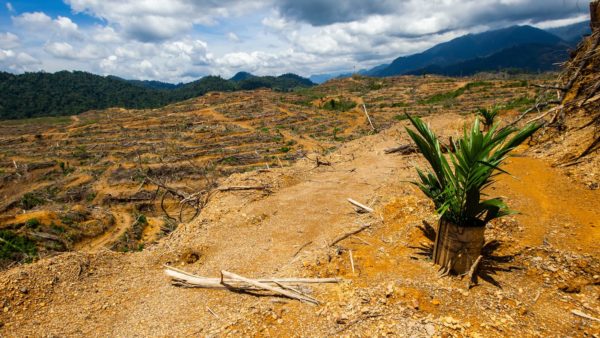Landscape in peril
This tiny oil palm seedling looks innocent enough…
..but plant thousands together, tend them well, and soon you will have a high-yielding super crop which returns profits to growers and governments, thanks to buoyant market demand.
This is the crux of the plantation model that has boomed in Indonesia since the 1990s, producing palm oil, wood pulp, rubber and other commodities for use in everyday items sold all over the world – on your menu, in your toothpaste or even in the tank of your car.
This expansion comes at a massive environmental and social cost. While responsibly produced palm oil can be a reality, parts of the industry are still failing the most basic tests of all – to keep out of the world’s last intact forests, to curb emissions of climate-warming gases, and to respect the rights of local communities and workers.
Over 25 percent of primary Sumatran rainforests were cleared between 2002 and 2019. As Sumatra’s largest remaining region of near-continuous tree cover, the Leuser forest is a rare survivor. But there are already large areas of oil palm planted within the ecosystem, with much more forest at risk.

Logging is another substantial threat, as well as mining, dams and other infrastructure development. Much of this activity is illegal under Indonesian law, but enforcement is patchy and political priorities often lie elsewhere. Meanwhile, wildlife crime surges along the route of new roads, with some rare species being poached to the edge of extinction.
What does the future hold?
Like anywhere, Indonesia is a country of multiple perspectives. Many of the things we recognise as a problem represent a solution to someone else. A poacher who traps songbirds may need the money to feed his family. A palm oil boss might clear forest illegally, if the price rises and the market asks no questions. A villager who keeps an orangutan as a pet might think they are doing the ape a favour – some farmers may be driven to kill an orangutan for raiding their fruit crops.
Think about this, and the way ahead becomes clearer. We must be cautious in the use of Western constructs of conservation. We must ensure human rights are upheld, as we open doors to sustainable ways for local communities to earn a living, at the same time as weakening the returns of deforestation and wildlife crime. LEAF works across this spectrum, with grant partners capable of imagining a different future as well as containing the threats of today.